- Home
- Nevil Shute
Pastoral Page 2
Pastoral Read online
Page 2
Johnson was there; he pressed the bell and ordered a couple of pints of beer. Few of the pilots drank anything but beer, partly from inclination and partly from economy. Marshall said: “Have any trouble getting her down?”
The other shook his head. “She came in all right. She was all right once I put the flaps down. But she was a swine to handle all the way home. One flap was out and wouldn’t go back. We had to fly her all the way, in half-hour spells. Then when we put the flaps down to land, she was all right.”
The beer came, two tankards on a tray borne by a white-coated W.A.A.F. “I looks towards you,” said Johnson.
“I catches your eye,” said Marshall.
“What are you doing to-day?”
“Going fishing.”
“Bet you don’t catch anything.”
“No takers.”
They had been together at Hartley aerodrome for nearly a year. At one time both had been novices of golf; they had laboured together round the Hartley course counting it a superior achievement to hole out in less than eight. Marshall had tired of it and turned to fishing; Pat Johnson had gone forward to a handicap of fifteen in the local tournament. In the evenings they had formed the habit of finding amusement together; they were friends. They were much the same age, and from very much the same social class. Marshall had worked for a year before the war in an insurance office in Holborn; Pat Johnson had been apprenticed to an estate agent in Croydon. Both had developed into seasoned and reliable pilots of large aircraft.
Johnson said: “Coming down to the ‘Black Horse’ after dinner? Take you on at shove-halfpenny.”
“If it’s not raining.”
“It won’t rain to-night.”
The “Black Horse” was one of the two pubs in Hartley Magna, tacitly dedicated to the air crews; other ranks went to the “Swan.” The “Black Horse” was rather more than a mere country pub; in peace-time it had been something of a road-house, with a snack-bar that still sold sandwiches. It was the only social centre within walking distance of the aerodrome; for the wider life it was necessary to catch the occasional bus for Oxford, fourteen miles away, or jump a ride if there was transport going to the city.
The pilots went and had their lunch together. A masterful, grey-haired woman of about forty-five, Flight Officer Stevens, came and sat by Marshall. “Morning,” she said. “I’ve got a bone to pick with you.”
Marshall knew what was coming; he had had this one with the Officer-in-charge-W.A.A.F. before. “Really?” he said innocently. “What’s that?”
“Your cup of tea. I cannot have the girls wasting their time bringing you up cups of tea in the middle of the morning. They’ve got their work to do, and that’s not it. If you want elevenses you must come down and get it.”
Marshall said: “It was only a little cup …”
“It was the biggest we’ve got on the station. She put two spoonfuls of sugar in, too, which isn’t allowed, and she’d have given you a third if I hadn’t caught her. Next time I’ll put her on a charge.”
“I wouldn’t do that.”
“I will. You see if I don’t.”
Marshall dropped the subject, uncertain if the officer was aware that he had got his cup of tea or not. Instead, he said: “If I catch a fish this afternoon can I have it for lunch tomorrow?”
Pat Johnson said: “That’s what they call an academic question.”
Mrs. Stevens said: “If it’s one tiddley little roach, you can’t. If it’s a fish that will feed several people, or a lot of fish, you can.”
“What do you call a lot of fish?”
“Three or four pounds.”
“That’s hitched his wagon to a star all right,” said Mr. Johnson.
They went on with the meal in silence. The grey-haired Flight Officer felt out of things beside these inconsequential young men. They had no right to make her feel … old, but they did. She could no longer put herself alongside twenty-year-old youth. That afternoon while they were at their games, or flying, she would be writing to her husband in the Western Desert, somewhere near Benghazi. She wrote every other day. The war had brought him two promotions, so that he was now Air Commodore Stevens, and that was splendid; but it had broken up their home. They had had a little house at Chislehurst which had been convenient when he was at the Air Ministry. Three years before, they had put the furniture in store, and shut the door, and left that little house. He had gone to Egypt, she had gone into the W.A.A.F.s, the two children had been sent to boarding-school. The furniture, all that they had, was burnt in the London blitz; when the war ended they would have to start all over again. In the meantime she must live with young men and young women twenty years her junior, lonely and out of it. She knew they took her for a dragon. She did not want to be a dragon, which was why she had allowed the girl Beatrice to take Marshall the cup of tea. But she could never get alongside them; she knew now that she never would. She was too old.
Marshall got away from her as soon as he decently could, and drank a quick cup of coffee in the ante-room. Then he went up to his bedroom; in five minutes he was on his bicycle riding out of the camp.
Coldstone Mill was a tall, factory-like building set in the countryside upon the River Fittel. A lane crossed the river on a stone bridge of two arches; a hundred yards below the bridge the mill stood by the weir, and below that again was the millpool. It was a broad, gravelly pool, scoured wide by the mill-stream and the weir, overhung by trees at the lower end. It stood in pasture fields, very sunny and bright.
The pilot left his bicycle at the mill and went down to the pool. For a time he walked slowly round the edge trying if he could see a fish; presently he sat down and began to assemble his rod. He fitted the little silvery reel and threaded the fine line, and chose the little trace with the single wire, as the rear-gunner had advised him. He spread out his collection of seven plugs upon the flat canvas of his bag and studied them thoughtfully. Finally he chose a desperate-looking parody of a small fish, more like a septic banana than a fish, and hooked it on the trace. Then, standing up, he began to cast over the pool.
He spent the next ten minutes clearing over-runs upon his reel. He was not a very skilled performer.
He fished for the next hour, supremely happy. The rhythm of the cast, the antics of the plug, delighted him; the warm sunlight, and the very fact of handling a well-designed instrument, made him content. The rush of water from the weir made a murmur that drowned the sound of the many aircraft that were in the sky, except when they passed closely overhead; the water slipping past over the green weed and the gravelly shallows was a thing remote from any of his duties.
He paused after an hour or so, and sat down on the ground, and lit a pipe. He took off the septic banana and fitted in its place a peculiar whirligig designed to represent a lame mouse taking swimming exercise, alleged to be very attractive to a pike. He was still sitting smoking when he turned to a step behind him.
It was Gunnar Franck, carrying his roach-pole and his little stool, on his way down to the quieter reaches of the river. “Phillips, he say you have come here,” he said. “Goes well?”
“Very well,” said the pilot. “Marvellous afternoon, isn’t it?” He lifted the little steel rod. “Have a crack with this.”
The Dane took the rod doubtfully, made an ineffective cast, and produced a tangle of line massed and jamming the reel. He handed the rod back to Marshall. “I shall go catch a roach,” he said. “When I come back, he will be disentangled, yes?”
The pilot began to unravel the line. “Just in time for you to muck it up again,” he said. “Getcha!” He glanced up at the Dane. “None of those bits hit any of the tanks, did they? I was thinking of that just now. I ought to have looked to see.”
“I looked.” Above their heads, in a bare elm tree, there was a sudden flap and clatter, and a pigeon flew off. They raised their heads to watch it. “I looked, but there was nothing. Only the bomb doors and the belly and the fabric underneath the tail. It is no damage, really
.”
Marshall said: “It was just as you said ‘Bombs away.’ Just after that, wasn’t it? We were running-up too long.”
“One minute only. Sixty-five seconds. I had the stop-watch running,” said Gunnar.
“We’ll have to get it shorter. I’d hate to get shot up by the Eyeties. I should die of shame.”
“Of shame?” The Dane wrinkled his forehead; there were still points of English manners that eluded him.
The pilot said: “Did you see that pigeon? This place is stiff with them. You haven’t got a gun?”
Gunnar shook his head. “Sergeant Pilot Nutter, he has a rifle. A little gun, his own. Two-two.”
“Bring it out with you next time you come and let’s see if we can’t get one or two. They’re bloody good eating, pigeons.”
“O—oh, yes. Pigeons is ver’ good eating. In my country we eat many pigeons.”
“Well, see if you can lay your hands on that gun, and let’s have a crack at them.”
“The farmer—it will be all right?”
“I’ll see the people at the mill and see if they mind. They ought not to. I’ll race around the mess and see if I can borrow a shot-gun. It’s a good thing to shoot pigeons. They eat the crops. It says so in the paper.”
“Perhaps the farmer does not read the paper.”
“Get that rifle, anyway.” The pilot wound the last of the line back smoothly on to the reel. He raised the little rod above and behind his head and flicked his arm; the plug went sailing out into the stream smoothly and with no effort.
“Nice,” said Gunnar. He stooped to the bag and picked out a reddish, translucent plug bait. “I think this one will be the best.” He pointed to the shallows and the backwater between beds of reeds. “There is the best place for a pike.”
The pilot said: “Too weedy and too shallow.” He paused. “Do you think we could get the run-up a bit shorter?”
“I will try.”
Marshall reeled the plug in to his feet and drew it dripping from the water. “I’ll try telling you the evasive action that I’m going to take, down the intercom. Each move, so that you know what’s coming. And you can tell me which way to bias it. We’ll have to waltz into position before levelling off.”
“It will be ver’ difficult,” said Gunnar doubtfully.
“We’ll have a stab at it to-morrow on the flight test.”
“Okay.” The Dane picked up his rod. “Now I will catch a roach for tea.”
Marshall called after him: “Don’t forget about that rifle.”
Gunnar raised his hand, and the pilot stood watching him for a moment as he went away down-stream between the trees in the dappled sunshine. He was a damn good chap, Marshall thought. That matter of the tanks—Gunnar never missed a thing. He’d probably get his roach all right.
Marshall turned back to the pool and began casting.
A quarter of an hour later he rested again, thoughtful. There might be something in what Gunnar said; pike liked sunny spots and sometimes came into quite shallow water. He did not think he could cast in among those reeds without catching his plug and losing it eventually; still, if it wouldn’t catch a fish what good was it to him? He cast the lame mouse up the backwater into a shallow swim between green beds of weed and drew it fluttering towards him. Was it his fancy, or was there something following behind the bait?
He cast to the same place a second and a third time, without result. Then he changed to the reddish plug that Gunnar had advised, and made an experimental cast or two out into the rough water of the pool. Having got his length he cast again to the same place, the gravelly, weedy shallow, and began reeling in.
In the backwater there was a sudden splashing gulp upon the surface. The line tightened and the little rod bent suddenly; he gripped it with both hands and heard the reel scream as the line went out. He knew at once that it was a bigger fish than he had ever hooked before; indeed, he had only caught two pike in his life, both very small. In the backwater there was a thrashing turmoil in the weeds with quick jerks on the line. He grasped the handle of the reel and got in line. The fish dashed from him up the backwater taking out line as he went; the pilot reeled him in again. Then, in the manner of a pike, the fight went out of him, and Marshall drew him through the swift water of the stream without a kick. He woke up when he saw the pilot and made a short run; then he was finished and came up to the surface as Marshall pulled him in. The great snapping mouth, cream-coloured underneath, was open, the red plug hooked firm in the lower jaw.
The young man breathed: “God, he’s a bloody monster.”
He had neither gaff nor landing-net nor priest. He had too much sense to touch the fish; he towed it with the rod, limp and supine in the water, to a little beach and pulled it up the sandy mud, wriggling and snapping the great jaws. Then with a stone he hit it gingerly upon the head, divided in his anxieties to kill it before it could escape, to kill it without injuring the look of it, and to avoid being bitten. Presently it lay still, and he pulled it up on to the grass.
He was excited and exultant; it seemed to him to be a most enormous fish. As soon as he dared put his hand near it he measured it with his thumb, which he knew to be an inch and a quarter from knuckle to tip; it was thirty-three inches long.
His heart was fluttering with excitement. Mechanically he began to take down his rod and pack up his gear; he would fish no more that afternoon. Anything after this magnificent experience would be an anti-climax; there was a time to stop and rest upon achievement, and this was it. Gingerly and timorously he poked a bit of string through the gills and made a loop. He slung his bag over his shoulder, and with the fish in one hand and his rod in the other went to find Gunnar.
A wet fish thirty-three inches long suspended by a bit of thin string is not a convenient burden if you want to keep its tail from dragging on the ground. Carrying it with his arm crooked Marshall found the muscular exertion quite considerable and it spread its slime all down his battle-dress trousers; carrying it over his shoulder upon the butt end of the rod was easier, and it spread its slime all down the back of his blouse. In the open air, and while the slime was fresh, this did not seem to matter very much; it became important to him later in the day.
Gunnar saw him coming in the distance and stood up from his little stool, and came to meet him. “That is ver’ good,” he said genially. “It is a ver’ good fish, that one.”
Marshall said: “Thirty-three inches.”
“So?” The Dane felt the weight of it. “With which plug?”
“The red one—and over in the shallows.”
Gunnar nodded. “He pull ver’ hard?”
Marshall said: “He gave up pretty soon.” He paused. “Have you done any good?”
“Two.” The sergeant pilot opened his bag and showed two quarter-pound roach lying upon a bed of grass.
“Coming back to the camp?”
Gunnar shook his head. “They are feeding well; I shall stay here.” He grinned. “I think that they have heard the news; so they come out to feed.”
Marshall glanced down at his fish. “I bet this one’s eaten a few roach in his time.”
He left Gunnar and walked up the bank towards his bicycle, carrying his awkward burden. He speculated as he went how much it weighed; his estimates showed a tendency to rise as he went on, so that the buoyancy of his spirits offset the fatigue of his arm. He reached the mill at last and spread the fish, now stiffening, across his bicycle basket and tied it insecurely there with string. Then he rode back to the camp.
The guard at the gate grinned broadly as he rode into the camp with a very large fish drooping at his handle-bars, and took occasion to salute him very formally. Marshall returned the salute and rode on to the mess past laughing groups of aircraftmen and W.A.A.F.s; nobody in the camp would ever say again that he could not catch fish. He parked the bike and, carrying the fish, went through into the kitchen and induced the W.A.A.F. cook to put it on the scales. It weighed eleven and a quarter pounds.
> “My!” she said. “That is a nice bit of fish now, isn’t it?” Her words were like music to him. “Will you have it stuffed, Mr. Marshall, like we did the other?”
He agreed, and she gave him a dish for it and arranged it stretched out at full length, and he carried it through into the dining-room and put it on the table for display. Then he went through to the ante-room to see whom he could find to show it to.
It was half-past five. There were half a dozen officers sitting reading in arm-chairs, and two W.A.A.F. officers looking at the illustrated papers. Marshall looked around for Pat Johnson to confound him, but Pat was not there, nor Lines, nor Humphries. Davy would have to do. Davy was reading about Lemmy Caution and his gorgeous dames, and detached his mind with an effort as Marshall said:
“I caught a bloody fine fish this afternoon. Come and have a look at it.”
“Where is it?”
“In the dining-room.”
“See it some other time, old boy.” The dame had brunette chestnut hair that fell down on a bare shoulder, and slim bare ankles thrust into white mules, and grey eyes, and curves in all the right places, a small black automatic pistol that pointed straight at Mr. Caution’s heart. It was asking too much to leave that for a dead fish.
Slightly damped, Marshall looked around. None of the old sweats of the Wing, the men that he had known for many months, happened to be in. There were only new arrivals that he did not know so well, officers who had been drafted to the station in the last month to replace casualties. There was a Canadian that he had hardly spoken to since he arrived a week before, just getting to his feet. Marshall said: “Like to come and see my fish?”
“What kind of fish?”
“Pike. Eleven and a quarter pounds.”
“I guess that’s pretty big, isn’t it?”
“Not bad.”
“Pike. Is that the same as a muskie—what we call a muskellunge in Canada?”
“I think it is. Come and have a look—it’s in the dining-room.”
The other said: “I’m real sorry, but I’ve got a date. I’m late for it already. Say, you want to come to Canada one day. I’ll take you where you can get a muskie, thirty pounds, any day of the week. Gee, I wish I was back there!” He waved his hand. “Be seeing you.”

 On the Beach
On the Beach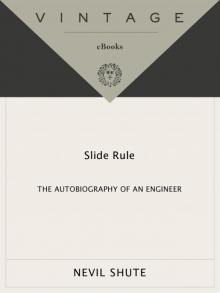 Slide Rule
Slide Rule A Town Like Alice
A Town Like Alice The Far Country
The Far Country Pied Piper
Pied Piper Round the Bend
Round the Bend An Old Captivity
An Old Captivity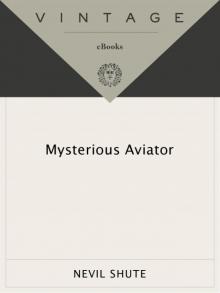 Mysterious Aviator
Mysterious Aviator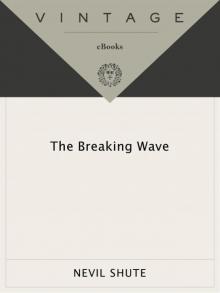 The Breaking Wave
The Breaking Wave Marazan
Marazan Lonely Road
Lonely Road Pastoral
Pastoral No Highway
No Highway Stephen Morris and Pilotage
Stephen Morris and Pilotage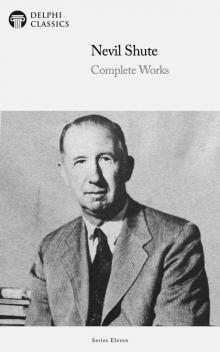 Complete Works of Nevil Shute
Complete Works of Nevil Shute Most Secret
Most Secret Beyond the Black Stump
Beyond the Black Stump The Rainbow and the Rose
The Rainbow and the Rose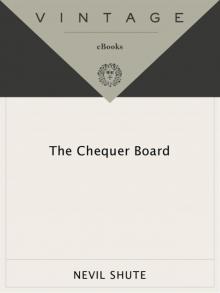 The Chequer Board
The Chequer Board Trustee From the Toolroom
Trustee From the Toolroom Ordeal
Ordeal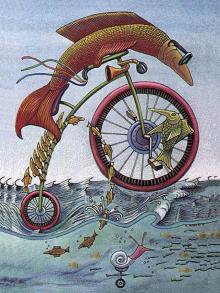 Stephen Morris
Stephen Morris